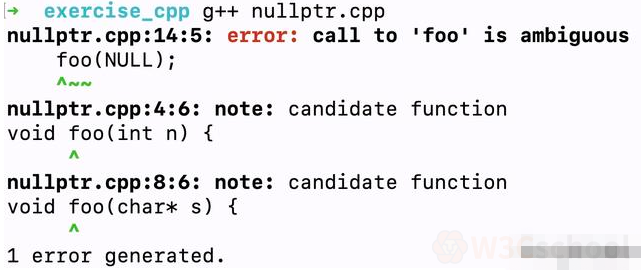An empty pointer can be used instead of nullptr
Jun 01, 2021 Article blog
Table of contents
The first thing to know is what an empty pointer is, and the empty pointer is
void*
In
C/C++
to avoid wild pointers (i.e. pointers do not point to any addresses), it is a good idea to initialize a pointer as soon as it is declared.
If it is not clear which variable the pointer points to for the time being, you can give NULL, such as:
int* p = NULL;
In addition to
NULL
the new standard for
C++11
introduces
nullptr
to represent an empty pointer.
nullptr
is neither an integer type nor a pointer type,
nullptr
type is
std::nullptr_t
which can be converted to any pointer type.
Why is it recommended to use nullptr instead of NULL?
This is because
NULL
is defined as a constant of 0 in
C++
and problems occur when a function overload is encountered.
For example, when there are two functions:
- void foo(int n)
- void foo(char* s)
Function overload:
C++
multiple similar functions of the same name to be declared in the same scope, and the list of parameters (number of arguments, type, order) of these functions of the same name must be different.
#include <iostream>
using namespace std;
void foo(int n) {
cout << "foo(int n)" << endl;
}
void foo(char* s) {
cout << "foo(char* s)" << endl;
}
int main()
{
foo(NULL);
return 0;
}Compile the above code, and the result is shown in the following image, and the compiler suggests that both functions may match to produce ambiguity.

With
nullptr
the compiler selects the function of
foo(char* s)
because
nullptr
is not an integer type.
#include <iostream>
using namespace std;
void foo(int n) {
cout << "foo(int n)" << endl;
}
void foo(char* s) {
cout << "foo(char* s)" << endl;
}
int main()
{
foo(nullptr);
return 0;
}The results of the operation are shown in the following image:

Therefore, when an empty pointer is required,
nullptr
is preferred instead of
NULL
These are the reasons why the empty pointer of
c++
is replacing NULL with
nullptr
I hope it will be helpful to everyone, and then students who want to learn more about
C++
NULL
C?tutorial: https://www.w3cschool.cn/cpp/
C?micro-class: https://www.w3cschool.cn/minicourse/play/cppminicourse
Source: www.toutiao.com/a6854549524803748356/